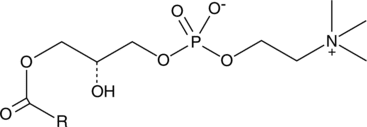Territorial Availability: Available through Bertin Technologies only in France
- Correlated keywords
- sn1 sn2 PLA-2 oxLDL lysoPC FA proinflammatory Lysophosphatidylcholines Blendmax 322D K Cosmesome L 10 Lysolecithin LPC 70H Emultop IP Glycerophosphocholines Glycerophosphorylcholines Lecimulthin 150 Lysocythins Lysoforte Lysolecithins Lysozithins QPFC-LC 100 SLP Sunsoft
- Product Overview:
Lysophosphatidylcholines are produced by hydrolysis of the fatty acid of phosphatidylcholine (PC; Item Nos. 24343 | 24370) at either the sn-1 or sn-2 position by phospholipase A2 (PLA2) or by lecithin-cholesterol acyltranferase (LCAT), which transfers the fatty acid to cholesterol.{24384} Lysophosphatidylcholine has effects on a variety of cell types, including smooth muscle cells, endothelial cells, T lymphocytes, monocytes, and macrophages among others. It is a major phospholipid component of oxidized low-density lipoprotein (ox-LDL), and it accumulates in animal models of atherosclerosis. Lysophosphatidylcholine also has pro-inflammatory properties through its activation and modulation of various signaling pathways, including the ERK pathway as well as through protein tyrosine kinase and G protein-coupled receptor (GPCR) signal transduction. It is released from apoptotic cells in vitro following caspase-3 activation of the calcium-independent PLA2 and acts as a chemoattractant for monocytes.{37411} Lysophosphatidylcholine (2 µl, 1%) injected into the caudal cerebellar peduncle of rats induces demyelination of axons in vivo, which are extensively remyelinated by oligodendrocytes six weeks following injection.{37412} This product contains lysophosphatidylcholine molecular species with primarily C16:0 fatty acyl chain lengths acylated to the sn-1 position. [Matreya, LLC. Catalog No. 1046]
Cayman Chemical’s mission is to help make research possible by supplying scientists worldwide with the basic research tools necessary for advancing human and animal health. Our utmost commitment to healthcare researchers is to offer the highest quality products with an affordable pricing policy.
Our scientists are experts in the synthesis, purification, and characterization of biochemicals ranging from small drug-like heterocycles to complex biolipids, fatty acids, and many others. We are also highly skilled in all aspects of assay and antibody development, protein expression, crystallization, and structure determination.
Over the past thirty years, Cayman developed a deep knowledge base in lipid biochemistry, including research involving the arachidonic acid cascade, inositol phosphates, and cannabinoids. This knowledge enabled the production of reagents of exceptional quality for cancer, oxidative injury, epigenetics, neuroscience, inflammation, metabolism, and many additional lines of research.
Our organic and analytical chemists specialize in the rapid development of manufacturing processes and analytical methods to carry out clinical and commercial GMP-API production. Pre-clinical drug discovery efforts are currently underway in the areas of bone restoration and repair, muscular dystrophy, oncology, and inflammation. A separate group of Ph.D.-level scientists are dedicated to offering Hit-to-Lead Discovery and Profiling Services for epigenetic targets. Our knowledgeable chemists can be contracted to perform complete sample analysis for analytes measured by the majority of our assays. We also offer a wide range of analytical services using LC-MS/MS, HPLC, GC, and many other techniques.
Accreditations
ISO/IEC 17025:2005
ISO Guide 34:2009
Cayman is a leader in the field of emerging drugs of abuse, providing high-purity Schedule I-V Controlled Substances to federally-licensed laboratories and qualified academic research institutions for forensic analyses. We are certified by ACLASS Accreditation Services with dual accreditation to ISO/IEC 17025:2005 and ISO Guide 34:2009.





